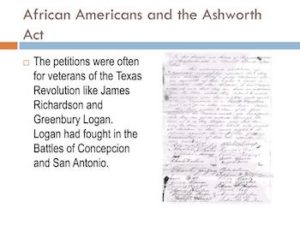
*The Ashworth Act was passed on this date in 1840. The Texas Senate passed this legislation.
It made the Ashworth Family, freedmen, and formerly enslaved people in the Republic of Texas exempt from a new law stipulating that all Black Texans either leave or be enslaved. The Ashworths were Portuguese North Africans. They migrated from South Carolina, then moved through Louisiana, finally ending their journey in the early 1830s in southeast Texas, at the town of Beaumont, when Texas was part of Mexico.
Before the 1836 ordinance passed by the General Council, the Ashworth family was viewed as white by Anglo-American settlers in Texas in 1836. They also owned slaves, raised cattle, and grew crops. On February 5, 1840, the Texas Congress passed an act that contradicted the act of 1837, reiterating the prohibition on free people of color emigrating into the then Republic of Texas. An addition also ordered all free slaves and nonwhites "who are now in this Republic" to leave by January 1, 1842, unless they had obtained express permission to stay from the legislature.
The penalty for disobedience, moreover, was severe. The person, formerly free, would be subjected to fines and, if unable to pay, sold to the highest bidder as a slave for life. Many nonwhites began to get the support they needed from their white neighbors by petitioning for their right to stay in Texas. Several petitions were created on behalf of these free people. Most notably and recognized of all the petitions written were of the Ashworths. Their petitions alone weighed the heaviest on the passing of the new act.
In the 1st petition of the Ashworths, forty-seven citizens endorsed and swore that they were "peaceable and respectable citizens." All the petitioners asked Congress to exempt them from the act. In the 2nd petition, seventy-two citizens from Jefferson County noted how they had "contributed generously to the advancement of the revolution." The 3rd petition was created for the right of Elisha Thomas to stay and continue to reside in Texas.
Representative Joseph Grigsby, one of the wealthiest slaveholders in Jefferson County, introduced the Ashworth petitions to the House. On November 5, 1840, the speaker referred the petitions to a select committee composed of Grigsby and two others. On November 23, 1840, the bill passed the Senate. The act then became law on December 12, 1840. Later, the law was dubbed the "Ashworth Act," which had a lasting impact. The final version extended its scope to include not just the Ashworths but all free people of color who arrived before the Declaration of Independence.